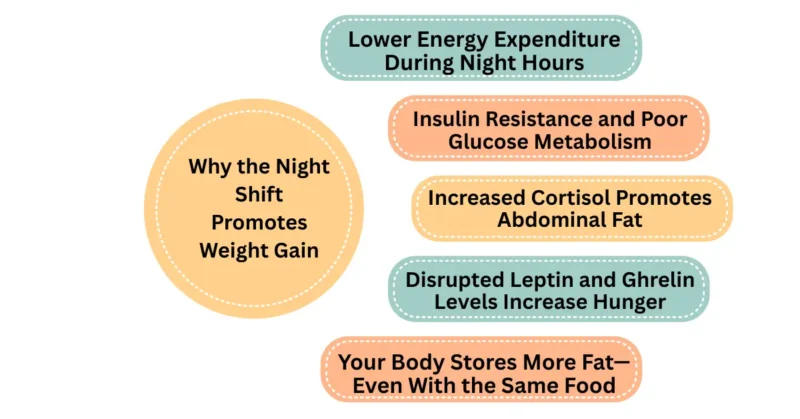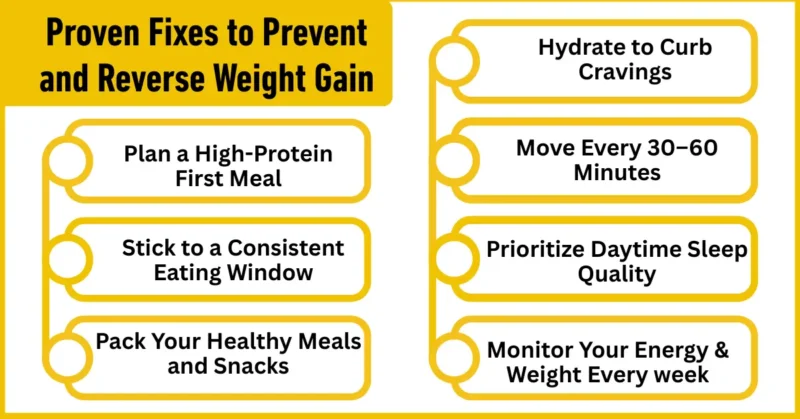Night shift weight gain is real—and dangerous. Learn the warning signs and science-backed solutions to stay fit, focused, and in control while working nights.
Thank you for reading this post, don't forget to subscribe!Night shift weight gain is more than a minor inconvenience—it’s a growing health concern backed by science. If you’re noticing extra pounds, constant cravings, or a sluggish metabolism, your overnight schedule might be to blame.
In this guide, we’ll explore the hidden triggers of weight gain during night shifts and offer practical fixes to help you reset your health and energy for good.
Night shift workers face more than just odd hours—they face a silent health threat: weight gain. Studies, including research from the University of Colorado Boulder, show that working the night shift burns fewer calories and increases fat storage.
If you’re gaining weight while working nights, it’s not your fault—your body is fighting against its natural rhythm. But there’s good news: with a few strategic changes, you can reverse the trend and stay in control.

Early Warning Indications of Weight Gain During Night Shifts
1. Constant Fatigue Even After Sleep
If you wake up after a full 7–9 hours and still feel like you haven’t slept at all, your body may not be getting the restorative sleep it needs. Daytime sleep is often lighter, fragmented, and less effective than nighttime rest. Poor-quality sleep disrupts your metabolism, increasing ghrelin (the hunger hormone) while decreasing leptin (the satiety hormone). As a result, your brain thinks you’re still tired and hungry, pushing you toward quick energy sources—typically sugary snacks or carb-heavy meals that promote weight gain.
2. Increasing Your Late-Night Snacking
Working through the night often leads to habitual snacking, even when you’re not physically hungry. Cravings for chips, candy, sugary drinks, and fast food become more intense due to hormonal shifts and mental fatigue. But here’s the problem: your body is naturally less efficient at digesting and metabolizing food during the night. You are more prone to retain the calories as fat, particularly visceral fat around your core. This cycle of fatigue, cravings, and metabolic slowdown quietly fuels weight gain night after night.
3. Tight Clothes and Increased Belly Fat
If your jeans feel tighter around the waist or you’ve noticed a visible increase in belly fat, your body could be reacting to insulin resistance, which is more common among night shift workers. Poor sleep and irregular eating schedules cause blood sugar to spike more easily, triggering your pancreas to release extra insulin. The body becomes less sensitive to insulin over time and stores excess glucose as fat, particularly around the abdomen, which is associated with metabolic diseases such as type 2 diabetes and heart disease.
4. Slower Digestion and Constipation
Night shift workers often report digestive discomfort, and it’s not just from poor food choices. Your digestive system also follows a circadian rhythm—it slows down significantly at night. Eating meals during this time can cause bloating, gas, constipation, or sluggish digestion. Additionally, low water intake, a lack of fibre, and minimal movement during shifts exacerbate the issue. It can impair the absorption of essential nutrients, making weight control more challenging, and also affects your comfort and energy levels.
5. Brain fog or mood swings
Do you have trouble focusing in the middle of your shift, or do you frequently snap at coworkers? These are indications of metabolic stress and circadian misalignment, not only drowsiness. Disrupted sleep and poor eating patterns can throw your hormones out of sync, particularly cortisol (a stress hormone), serotonin (a mood-regulating hormone), and insulin (a hormone involved in energy balance). It leads to increased irritability, mental fatigue, emotional eating, and reduced motivation to stay active—all of which create the perfect storm for unhealthy weight gain and burnout.
Why the Night Shift Promotes Weight Gain
Your body operates on a powerful internal clock called the circadian rhythm—a 24-hour cycle that regulates sleep, hormone production, metabolism, and energy utilization. Under normal conditions, this rhythm is synchronized with the cycle of day and night. Daytime is for activity, calorie burning, and food digestion; nighttime is for rest, repair, and metabolic slowdown.
But night shift work forces your body to operate against this natural programming. The result? Your metabolism becomes confused and inefficient, leading to weight gain, even if your calorie intake doesn’t change.

Let’s break down exactly what happens when the circadian rhythm is thrown off:
1. Lower Energy Expenditure During Night Hours
Your body naturally burns fewer calories at night—even if you’re awake and active. Research indicates that the resting metabolic rate decreases during nighttime hours due to hormonal suppression. It means your body requires less energy to function, and the food you eat is more likely to be stored rather than burned.
A study published by the University of Colorado Boulder found that people working night shifts burned 52–59 fewer calories per day, contributing to slow and steady weight gain over time.
2. Insulin Resistance and Poor Glucose Metabolism
One hormone that aids in the absorption of glucose by your cells for energy is insulin. At night, insulin sensitivity drops significantly, even more so when you’re sleep-deprived or eating at odd hours.
When you work night shifts and eat during these periods of lowered sensitivity:
- Your blood sugar stays elevated longer.
- More insulin is released, which promotes the storage of fat.
- Cells become resistant, leading to prediabetes or type 2 diabetes over time.
Even a healthy meal eaten at midnight can have a higher fat-storing effect than the same meal eaten at noon.
3. Increased Cortisol Promotes Abdominal Fat
Cortisol, the body’s primary stress hormone, follows a natural rhythm, too—it rises in the morning to wake you up and falls at night to prepare you for rest. But with night shift work, that cycle becomes inverted or chronically elevated.
Prolonged high cortisol levels:
- Increase abdominal (visceral) fat
- Break down muscle tissue for energy.
- Interfere with hunger signals.
- Promote inflammation and fatigue.
Not only is abdominal fat purely aesthetic, but it is also associated with major health problems like metabolic syndrome, insulin resistance, and heart disease.
4. Disrupted Leptin and Ghrelin Levels Increase Hunger
Two key hormones regulate your hunger:
- Leptin: tells your brain you’re full
- Ghrelin: signals hunger
Night shift work throws both out of balance. Sleep deprivation (common among shift workers) lowers leptin and raises ghrelin, making you feel constantly hungry—even when your body doesn’t need more food.
It explains why night workers often crave carb-heavy, salty, or sugary snacks. The cravings aren’t just emotional—they’re hormonally driven.
5. Your Body Stores More Fat—Even With the Same Food
Here’s the bottom line: you could eat the same meal and the same number of calories as someone working a day job, but your body will handle it differently at night.
Why?
- Slower metabolism
- Greater insulin resistance
- Less energy burned
- More fat-storing hormones in circulation
- Poor sleep quality, which further reduces fat oxidation
Over weeks and months, these small differences accumulate into significant fat deposits, particularly around the belly, thighs, and face.
Key Takeaway
The problem isn’t just what you eat—it’s when and how your body processes that food. Night shift work creates a perfect storm of hormonal and metabolic shifts that favour fat storage over fat burning.
But awareness is power. By adjusting your meal timing, sleep hygiene, and daily physical activity, you can reset your internal rhythm and regain control over your health.
Proven Fixes to Prevent and Reverse Weight Gain

1. Plan a High-Protein First Meal
Starting your shift with a smart, protein-rich meal sets the tone for stable energy and fewer cravings. A high-protein intake slows digestion, balances blood sugar, and promotes satiety—crucial during long overnight hours when vending machine temptations strike hardest.
Smart meal ideas:
- Steamed broccoli and quinoa with grilled chicken breast
- Greek yogurt topped with flaxseeds and blueberries
- Avocado toast with a piece of hard-boiled eggs
- Lentil soup with olive oil drizzle and whole-grain crackers
Aim for 25–30g of protein in your first meal to reduce post-shift binge eating and prevent metabolic slowdowns.
2. Stick to a Consistent Eating Window
Following a time-restricted eating window—such as eating only within 10 hours during your shift—keeps your body’s internal clock in rhythm, even when you’re working nights. This strategy has been shown to improve insulin sensitivity, reduce late-night snacking, and support fat burning.
Example schedule for night workers (7 PM to 5 AM shift):
- First meal: 6:30 PM
- Mid-shift snack: 10 PM
- Light meal: 2 AM
- Last small snack: By 4:30 AM
Avoid eating after your shift ends to allow your body to rest and reset metabolically.
3. Pack Your Healthy Meals and Snacks
Shift workers often make the mistake of relying too heavily on cafeteria meals and snacks from vending machines, which are high in unhealthy fats, sugar, and salt. Meal prepping at home gives you full control over your nutrition and portions while saving time and money.
Easy grab-and-go ideas:
- Boiled eggs and veggie sticks (carrot, cucumber, celery)
- Chia seed, almond milk, and frozen berries overnight oats
- Hummus with whole-grain crackers or bell pepper strips
- Tuna salad lettuce wraps
- Cottage cheese with sliced peaches
Always include protein + fibre to maintain fullness and reduce blood sugar spikes.
4. Hydrate to Curb Cravings
Dehydration often feels like hunger, especially late at night. Drinking water regularly during your shift helps control appetite, supports digestion, and improves energy.
Hydration tips:
- Start your shift with a large glass of water
- Keep a refillable water bottle at your station.
- Add cucumber slices, lemon, or mint to enhance flavour.
- Limit sugary sodas and energy drinks that spike insulin.
- Avoid high-caffeine drinks after 2–3 AM to protect your post-shift sleep.
Aim for at least 8–10 cups of water throughout your shift.
5. Move Every 30–60 Minutes
Sedentary night shifts slow your metabolism and promote fat storage, especially around the abdomen. Incorporating light movement can enhance circulation, burn more calories, and boost alertness.
Mini movement options during your shift:
- A 5-minute brisk walk around your work area or building
- Desk stretches target your spine, neck, and hips.
- Use a standing desk for a few hours at a time.
- Take the stairs instead of the elevator when possible.
- Walking meetings or phone calls while pacing
Small bursts of activity add up and reduce the metabolic effects of prolonged sitting.
6. Prioritize Daytime Sleep Quality
Poor sleep leads to higher cortisol levels, increased hunger hormones (such as ghrelin), and lower leptin levels (a satiety hormone)—a dangerous combination for weight gain. Prioritize your rest as seriously as you do work.
Sleep hygiene tips for night shift workers:
- Use blackout curtains or sleep masks to block light
- Keep your bedroom cool (65–68°F or 18–20°C)
- Use white noise machines or earplugs to block daytime noise.
- Shut off screens 30–60 minutes before bed to reduce blue light exposure.
- Consider taking melatonin or magnesium supplements, as recommended by a doctor.
To help with hormone regulation and recuperation, aim for 7 to 9 hours of restful sleep after your shift.
7. Monitor Your Energy and Weight Every week
You may stay accountable and identify minor problems before they become significant setbacks by keeping track of your progress. Weight is only one aspect of your overall wellness; monitoring your energy, mood, sleep, and food consumption provides a more comprehensive picture.
Tracking tools you can use:
- Journals (paper or digital)
- Mobile apps like MyFitnessPal, Zero, or Fitbit
- Weekly weigh-ins, done at the same time each week
- Record how clothes fit, mood patterns, and hunger signals.
By becoming aware of your patterns, you’ll gain the clarity needed to tweak your routine and stay on track without feeling overwhelmed.
Sample Night Shift Eating Schedule (10-Hour Window)
| Time | What to Eat |
|---|---|
| 6:30 PM | Protein-rich meal (e.g., chicken, brown rice, veggies) |
| 9:30 PM | Snack (nuts or yogurt) |
| 12:00 AM | Light meal (salad with eggs or tofu) |
| 2:30 AM | Small snack (apple + peanut butter) |
| After shift | Herbal tea, then sleep (no heavy meal) |
FAQs on Night Shift Weight Gain
Q. How to avoid gaining weight on the night shift?
Start your shift with a high-protein, balanced meal to prevent cravings later. Stick to a consistent eating window and avoid grazing throughout the night. Prep your meals in advance to avoid vending machines and processed snacks. Hydrate often—thirst is often mistaken for hunger. Prioritise quality sleep by using blackout curtains and establishing a consistent routine. Move every 30–60 minutes to boost your metabolism. Lastly, keep a weekly log of your weight and behaviours to monitor any potential changes.
Q. What causes sudden weight gain overnight?
Sudden overnight weight gain is usually water retention, not fat gain. Common triggers include consuming salty foods, hormonal fluctuations, inadequate sleep, or excessive stress. Late-night eating or consuming carbohydrate-rich meals can also lead to temporary fluid retention. The body paradoxically retains water when dehydrated. For women, the menstrual cycle can lead to weight spikes. Unless you’ve consumed over 7,000 extra calories in one day, the weight gain is temporary. It usually resolves within 1–3 days with proper hydration and sleep.
Q. Why is it so hard to lose weight on the night shift?
Because working the night shift disrupts your circadian rhythm, you may store more fat and have a slower metabolism. Hormones like cortisol and ghrelin rise, triggering cravings and hunger. Insulin sensitivity drops at night, meaning your body processes food less efficiently. Poor sleep also reduces the body’s ability to burn fat and recover from muscle damage. Stress and exhaustion make it more difficult to maintain healthy choices. Social isolation may lead to emotional eating or boredom snacking. These combined effects make weight loss more challenging without a strategic plan.
Q. Is it true that you tend to gain weight at night?
You don’t gain fat overnight, but your weight may fluctuate due to water retention or changes in your digestive system. Your body may retain water if you eat late, especially if the meal is heavy in carbohydrates or salt. Night shift workers burn fewer calories at night due to slower metabolism. If you regularly eat during inactive hours, the body may store more fat. Poor sleep further disrupts hormones that regulate appetite and fat storage. These factors contribute to weight gain over time rather than causing it instantly. Consistency in sleep and diet matters more than the time spent on them.
Q. Why did I gain 2 kg overnight?
A 2 kg overnight weight gain is typically due to water retention, not fat accumulation. It can result from eating more sodium, carbs, or processed foods the previous day. Lack of sleep or increased stress can elevate cortisol levels, resulting in fluid retention. For women, hormone shifts from ovulation or PMS can lead to temporary bloating. Alcohol, dehydration, or a heavier-than-usual meal can also cause spikes. The body often sheds this weight within one to two days. Track trends weekly instead of reacting to daily scale changes.
Q. How to lose 1 kg overnight?
Losing 1 kg of actual body fat overnight is not realistic or healthy. However, by avoiding salty meals, drinking plenty of water, and getting sufficient sleep, you can temporarily reduce your water weight. Light exercise, like walking or stretching, may help reduce bloating. Avoid processed foods, caffeine, and sugary drinks before bed. Keep your last meal light and eat early in your shift if you’re a night worker. Keep in mind that any “overnight loss” is probably fluid rather than fat. Adopting healthy habits and maintaining a long-term calorie balance are essential for achieving sustainable fat loss.
Final Thoughts: Balance Is Possible When Night Shift Weight Gain
Weight gain during night shifts isn’t a personal failure—it’s a biological challenge. However, you can regain control of your life by aligning your lifestyle with proven strategies. You can boost your attitude, vitality, and long-term health in addition to your weight by eating mindfully, getting enough sleep, and moving steadily.
Read more Health and Wellness Tips.
You might like:

